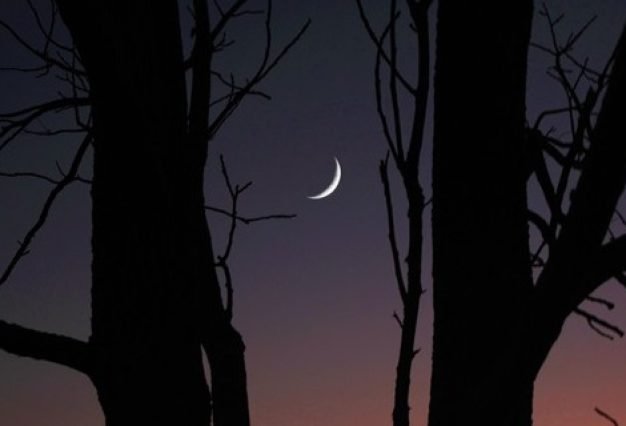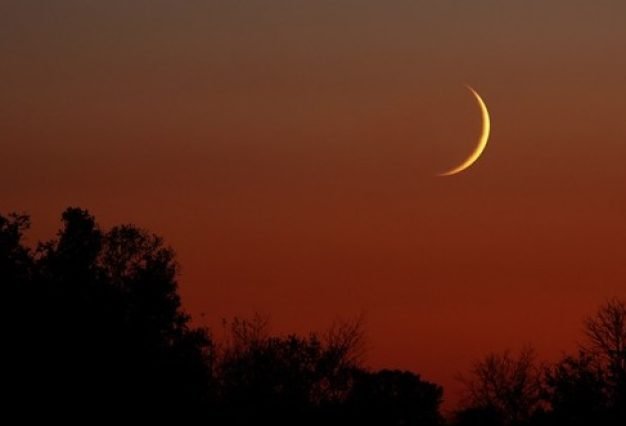By Shaykh Muftī Radā-ul-Ḥaq
Rendered into English by Yūsuf Badāt
Questions:
Regarding our questions, we would like to bring to your attention that Muslims of various countries and continents of the world have populated Canada, in large numbers. Masājid, schools and religious institutions have been established as well. Muslims of various backgrounds constantly marry, work and live together among themselves. People from different countries have joined together, in the masjids also. However, Ramadān and Eīd dates are disunited, which results in Eīd being celebrated on two separate days in the very same home. To eliminate this problem, some reputable scholars, mosques and Islamic centers have formed a group. This committee considers the entire world as one horizon. They have formalized some guidelines and criteria, with an effort to bring ease upon the Muslim community. The guidelines and rules are written below.
- Date of sighting the crescent must be observed on the 29th.
- Decision will be made based on the actual sighting of the first moon (hilāl) with the naked human eye.
- Testimony will be taken from people who claim to have seen the first moon. If the skies are clear in the area where the sighting assumingly was made, then the testimony of ten people will be preferred to declare the new lunar month and decided through the testimony of a minimum of two witnesses. If the sky is cloudy or hazy then the testimony of a minimum of two witnesses will be required to establish the new lunar month.
- Sighting reports will be accepted from any country of the world where we are able to obtain reliable information by technology tools available to us.
- Testimony will be taken from organizations whom we have agreements and communication with, that have declared the sighting of the first moon (hilāl).
- A testimony can be rejected due to external evidence such as the impossibility of sighting the first moon according to astronomical data in the region where the sighting was claimed to have been made.
- Astronomical data will be used for informing the public about the scientifically most possible date of the new lunar month for the ease of logistics, but will be confirmed and declared upon the actual sighting of the first moon.
- This criteria will be adopted for all twelve Islamic lunar months
Please kindly provide your valuable input related to the entire world considered as one horizon “International Moon Sighting” and the aforementioned guidelines.
Also, if after sunset, crescent sighting is established and declared by local scholars in those countries that are 5 or 6 hours ahead of Canada (for example South Africa etc.), would it be permissible for us to make the announcement here in Canada before our sunset?
Answer:
In the Name of Allāh, the Most Compassionate, the Most Merciful. May Allāh Send Blessings upon the Unlettered Prophet [Muḥammad]
We have written in [the book] Fatāwa Darul Uloom Zakariyya, that in countries that are distant [from each other], ikhtilāf al maṭāli’ (individual local regional sightings) is considered. This is the standpoint of the muta‘akhkhirīn (later scholars). There are references recorded there [in the book], pertaining to this view. However, there is also no objection in adopting the other view point for the unity of the country which is actually the dhāhir al riwāyah (predominately strong view). In fact, it will be more appropriate and better (to adopt the global sighting view).
In South Africa, the local scholars have adopted the first view point [of ikhtilāf al maṭāli’ – individual local regional sightings] due to numerous purposeful objectives that are before them. As for your good selves, you are certainly permitted to adopt the dhāhir al riwāyah (predominately strong view) due to beneficial objectives [that you encounter]. In doing so, this will not be categorized as talfīq (piecing together various viewpoints from more than one madhab against the known principles of jurisprudence), rather both viewpoints exist within the parameters of the madhab (school of Islamic law). The synopsis of the dhāhir al riwāyah (predominately strong view) in countries nearby and at distances, is that the reliable sighting of another country can serve as evidence for the people of Canada. For this stance, there is no need to list religious proofs for knowledgeable persons like yourselves, since these evidences of jurisprudence are already clear before you. Despite that, we present a few hereby:
“On the authority of Shams al Ai’mmah, Imām al Halwāni: There is no consideration of ikhtilāf al maṭāli’ (individual local regional sightings). This is the stronger view”. (Sharh Tuḥfat al Mulūk li Muḥammad bin Abd al Laṭīf al Ma’rūf bi Ibn al Malak, volume 2 page 1264)
In the explanatory remarks of this, the following is narrated from Majma’ al Anhur (volume 1 page 291):
“This is the madhab (school of Islamic jurisprudence) and the fatwā (legal verdict) is upon this viewpoint, as is found in most reliable texts.”
The following is documented in Ṭahṭāwī alā al Dur
“As stated, it is binding upon the people of the east due to the sighting of the people in the west, as long as the crescent sighting is established by them through a legally reliable method. This is the view found in al Dur. The author has discussed the matter with generality, hence the verdict will include any distance between the countries, whether the distance entails multiple horizons or not”. (al Ṭahṭāwī alā al Dur volume 1 page 449)
Keeping this viewpoint in mind, you are definitely permitted to make a decision of Ramadān and Eīd, based on the authentic verified news of other countries.
Here-below are the answers to your questions, in numerical order:
- The date of crescent sighting must certainly be observed on the 29th eve of the lunar month.
- In the light of aḥādīth (prophetic reports) and fiqh (jurisprudence), this is also accurate that the decision of Ramadān and Eīd be made based on the actual sighting of the first moon (hilāl) with the naked human eye.
- In the scenario where the horizon is clear, it is necessary to have khabr mustafīdh (reports from multitudes of people). If the members of such a crescent committee are satisfied with the testimony of 10 persons and the testimony is also not against external evidences, then it is correct for you to accept their testimony and make the declaration [regarding the lunar months]. Imām Abū Yūsuf (may Allāh have mercy upon him) has suggested 50 persons [for khabr mustafīdh]. Imām Khalaf bin Ayūb (may Allāh have mercy upon him) has stated that in the region of Balkh 500 people are also regarded as few. The more appropriate verdict is that this matter be left to the decree of the islamic judge”. (al Fatāwa al Sirājiyah page 168)
- After issuing the fatwā (legal verdict) of non-consideration of ikhtilāf al maṭāli’ (individual local regional sightings), you may accept the khabr mustafīdh (reports from multitudes of people) from other countries, provided that the country’s decision is not against external evidences. The purpose for this clause is that after the announcement of crescent sighting, in some countries, the next day also, the moon is not visible. Sometimes the claim is made of a moon aging up to 6 or 7 hours.
- You can also accept the crescent sighting from countries where you have mutual agreements and communication, provided it is not against external evidences and it falls within the parameters of [scientific] sighting possibility.
- You should not accept the crescent sighting reports from places where sighting is [scientifically] impossible, unless the skies are clear and multitudes of people have actually observed the reported crescent sighting. Imām Ibn Shihnah al Halabī in the [book], Sharḥ Mandhūmah ibn Wahbān, declares, “The intellectual giant of the contemporaries from the Shāfi’e school, Imām Taqī al Dīn al Subkī (may Allāh have mercy on him) has authored a book on this topic. He has indicated in it, the validity of their statements (astronomers / timekeepers), for indeed mathematical calculations establish certainty”. (Sharḥ Mandhūmah ibn Wahbān li Ibn al Shihnah al Halabī page 92). In other words, Imām Taqī al Dīn al Subkī (may Allāh have mercy on him) is of the opinion that calculations lead to definiteness. Majority jurists do not accept the declarations of astronomers. However in the modern era, their scientific declarations should be considered to negate [false crescent sightings]. Meaning, when they say that sighting is impossible then sighting does not occur.
- This clause is also absolutely correct. The day when there is greater [scientific] possibility of moon sighting, more importance should be stressed to observe the crescent.
- The act of moon sighting should be given due importance for all twelve months of the year, so that the crescent sightings of Shā’ban, Ramadān and Eīd be made a constant practice.
If the occurrence of crescent sighting is established after sunset in those countries that are in a time zone 5 or 6 hours before you [in Canada], you may declare your announcements of Ramadān and Eīd. It is essential to note that if the announcement of Eīd al Fiṭr is declared at A’ṣr [in your time zone], then the fast of that day must be completed.
“When the crescent of ending the fasting period (Eīd) is seen during the day, they must complete the fasting of that day” (al Fatāwa al Sirājiyah page 169)
And Allāh Almighty Knows Best




